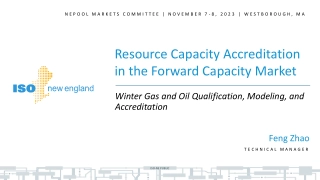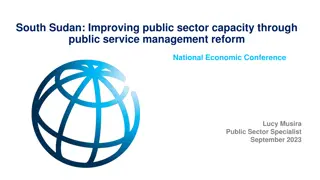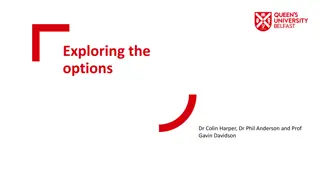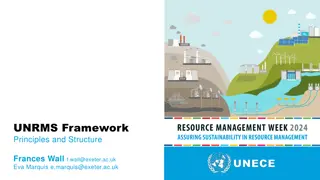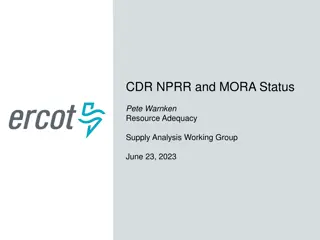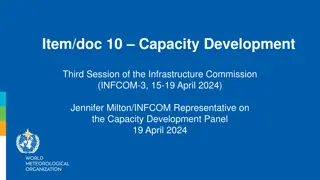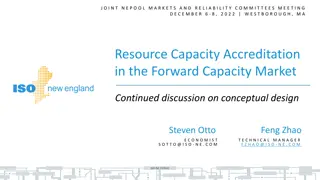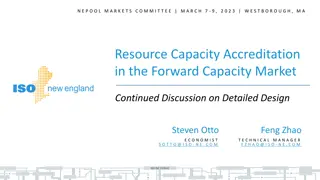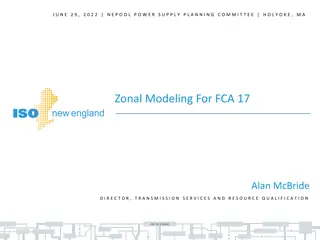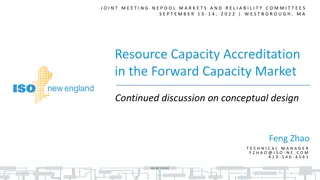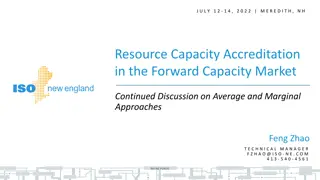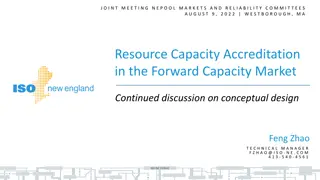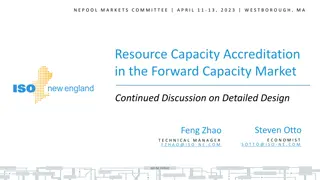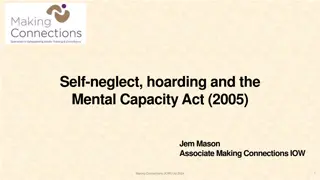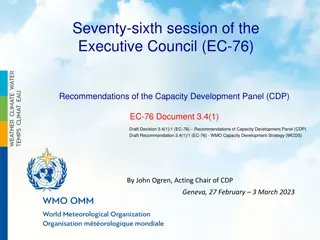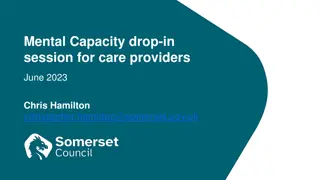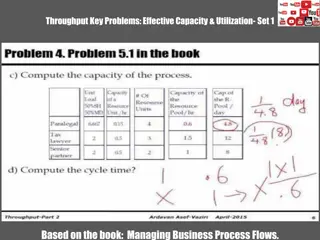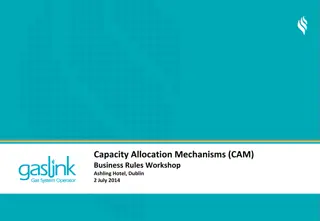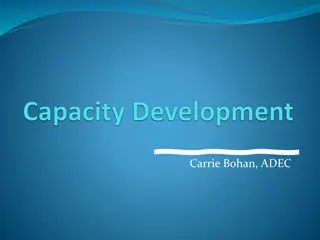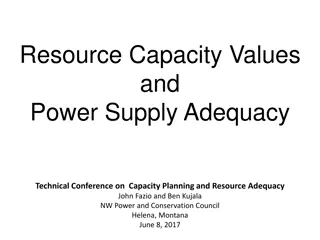Enhancing Public Service Professionalization Through National School of Government Positioning
This presentation outlines the strategic response to public service reform towards professionalization by positioning the National School of Government (NSG) to build state capacity, address deficiencies in various departments, and strengthen governance for effective service delivery in South Africa
0 views • 19 slides
Resource Capacity Accreditation in the Forward Capacity Market
The presentation discusses the Resource Capacity Accreditation (RCA) project in the Forward Capacity Market (FCM) by ISO-NE, aiming to improve accreditation processes to support a clean-energy transition. It emphasizes modeling and accrediting gas and oil resources for resource adequacy as the energ
0 views • 38 slides
Efficient Resource Mobilization and Management Strategies by Dr. Abraham Maliet Mamer
This content discusses efficient resource mobilization and management strategies, emphasizing the importance of understanding the typical cycle of resource regime, defining resources, identifying resources, and mobilizing resources effectively. It provides insights into resource allocation methodolo
1 views • 12 slides
Enhancing Public Sector Capacity Through Service Management Reform
South Sudan is working on improving public sector capacity through service management reform, focusing on institutionalizing capacity building, pay and grading, pension support, and strengthening the center of government. Lessons from capacity injection mechanisms and policy frameworks are guiding t
0 views • 16 slides
Global Hydrogen Projects Outlook and Electrolyzer Capacity Analysis
This outlook delves into the IEA Hydrogen Production Projects Database to provide an update on the status of global hydrogen projects. It covers the timing and capacity of new electrolyzer installations, projecting significant growth in electrolyzer capacity by 2030 to meet Net Zero Emissions Scenar
1 views • 16 slides
Exploring Key Distinctions in Legal and Mental Capacity Frameworks
This presentation delves into the crucial distinctions within the legal and mental capacity frameworks, focusing on concepts such as legal personhood, legal capacity, and mental capacity as defined in the MCA (NI) 2016. It explores the implications of these distinctions on decision-making abilities
4 views • 23 slides
Comprehensive Overview of UNRMS Framework and Principles
UNRMS (UN Resource Management System) aims to promote sustainable resource management globally through innovative frameworks and principles. It encompasses various natural resources and supports sustainability at different scales. Stakeholders can use it to assess projects against environmental, soc
5 views • 10 slides
ERCOT Resource Adequacy Analysis Overview
ERCOT's resource adequacy analysis involves multiple aspects such as Capacity, Demand, and Reserves Report status, NPRR submissions, ELCC definitions, and MORA tabs detailing risk assessment and historical trends. The analysis covers upcoming changes in methodologies, seasonal release schedules, and
1 views • 13 slides
INFCOM Capacity Development Initiatives Overview
INFCOM's capacity development initiatives focus on enhancing Earth system observations, closing capacity gaps on weather services, and supporting new opportunities in competencies and capabilities. Collaboration and coordination mechanisms have been established to facilitate sharing of information a
0 views • 11 slides
Understanding Disk Storage Systems in Computer Science
Disk storage systems play a crucial role in computer architecture. This tutorial delves into the differences between disks and main memory in terms of access time, capacity calculations, block sizes, rotational delays, and transfer rates. It covers key concepts such as track capacity, surface capaci
0 views • 23 slides
Joint NEPOOL Markets and Reliability Committees Meeting December 6-8, 2022, Westborough, MA
A meeting discussing Resource Capacity Accreditation in the Forward Capacity Market, focusing on improving accreditation processes to support a reliable transition to clean energy. The presentation outlines the proposed improvements for FCA 19, emphasizing the accreditation of resources based on the
0 views • 81 slides
Resource Capacity Accreditation in Forward Capacity Market Overview
Resource Capacity Accreditation project aims to enhance ISO-NE's accreditation processes in the Forward Capacity Market, supporting a reliable, clean-energy transition. Key concepts covered in this educational presentation include accreditation space, methods, benefits, challenges, and improvement o
1 views • 53 slides
Resource Capacity Accreditation in the Forward Capacity Market Discussion
The presentation discusses improvements in the Resource Capacity Accreditation project of ISO-NE's Forward Capacity Market to support a reliable, clean-energy transition. It includes details on seasonal components, reconfiguration auctions, trading obligations, and stakeholder schedules. Examples pr
3 views • 71 slides
Capacity Zone Modeling for Forward Capacity Auction 17 Results
This presentation unveils the Capacity Zone modeling calculations for Forward Capacity Auction 17 associated with the 2026-2027 Capacity Commitment Period by ISO-NE PUBLIC. It delves into boundary definitions, import-constrained zone modeling, and market rules guiding the assessments and modeling pr
0 views • 16 slides
Resource Capacity Accreditation in Forward Capacity Market Discussions
Discussion on the conceptual design for Resource Capacity Accreditation in the Forward Capacity Market, focusing on improvements to accreditation processes to support a reliable transition to clean energy. The presentation outlines methodologies to accredit resource contributions, commitments to pro
0 views • 34 slides
Understanding Amity School of Engineering & Technology Vectors in Java
Amity School of Engineering & Technology Vectors provide a flexible way to manage dynamic arrays in Java programming. With capabilities to store objects of any type and accommodate dynamic resizing, these vectors offer optimized storage management through capacity and capacity increment settings. Co
0 views • 18 slides
Resource Capacity Accreditation in Forward Capacity Market Discussion
The Resource Capacity Accreditation project by ISO-NE aims to enhance accreditation processes in the Forward Capacity Market. This presentation reviews key concepts, including nomenclature, Marginal vs. Average approaches, and follow-up items from previous meetings. It emphasizes the commitment to a
0 views • 41 slides
Forward Capacity Market Resource Capacity Accreditation Discussion
Discussion on improvements to resource capacity accreditation in the Forward Capacity Market to support a reliable, clean-energy transition by accrediting resource contributions effectively as the resource mix evolves. Covers conceptual design, stakeholder schedule, and review of proposed enhancemen
0 views • 61 slides
Proposal for Resource Capacity Accreditation in Forward Capacity Market
The ISO-NE has proposed improvements to the accreditation processes in the Forward Capacity Market (FCM) through the Resource Capacity Accreditation (RCA) project. The aim is to enhance the accreditation of resource contributions to ensure reliability during the transition to a cleaner energy mix. T
0 views • 59 slides
Population Resource Regions and Zelinsky's Classification
Geographers have long studied the relationship between population growth and resource adequacy, leading to the concept of Population Resource Regions (PRR) by W. Zelinsky. Zelinsky identified five types of PRR based on population-resource ratios, ranging from Type A with high resource utilization po
0 views • 8 slides
Resource Capacity Accreditation in the Forward Capacity Market: Continued Discussion and Detailed Design
The Resource Capacity Accreditation (RCA) project by ISO-NE aims to enhance accreditation processes in the Forward Capacity Market (FCM) to support a reliable, clean-energy transition. This presentation focuses on seasonal components of Capacity Supply Obligations (CSO), Pay-for-Performance (PFP) ob
0 views • 58 slides
Understanding Self-Neglect, Hoarding, and the Mental Capacity Act (2005)
Self-neglect and hoarding are complex issues often intertwined with mental capacity challenges. The Mental Capacity Act (2005) outlines capacity assessments, decision-making criteria, and challenges faced by professionals in safeguarding individuals. Recognizing the need for trauma-informed care in
1 views • 16 slides
Understanding Legal and Mental Capacity in Healthcare Decisions
Clinical specialist occupational therapist, Louise Lawlor, advocates for patients' rights and decision-making capacity in healthcare settings. She emphasizes the importance of legal and mental capacity in making informed decisions, highlighting relevant legislation, guidance documents, and a functio
0 views • 24 slides
Exploring Capacity and Volume in Practical Settings
Explore the concepts of volume and capacity through engaging activities involving measuring liquid in containers, understanding units like milliliters and liters, and solving capacity-related questions. Discover how to work out different measurements and practice practical capacity in the kitchen wi
0 views • 7 slides
Understanding Enthalpy and Heat Capacity in Chemistry
Enthalpy is a measure of total energy in a system, represented as H = E + P.V. Heat at constant pressure relates to enthalpy changes. Calorimetry and heat capacity help measure and understand heat in chemical reactions. Specific heat capacity and molar heat capacity play key roles in determining ene
0 views • 16 slides
Zorua: A Holistic Resource Virtualization in GPUs Approach
This paper presents Zorua, a holistic resource virtualization framework for GPUs that aims to reduce the dependence on programmer-specific resource usage, enhance resource efficiency in optimized code, and improve programming ease and performance portability. It addresses key issues such as static a
0 views • 43 slides
Workshop on New Approaches to Statistical Capacity Development in Lao PDR
This workshop, hosted by PARIS21 and UNDP, focuses on enhancing statistical capacity development in Lao PDR. It covers topics like successful capacity development programs, partnerships for national statistics development, and prioritizing needs versus international requirements. The Lao Statistics
0 views • 15 slides
Changes in Capacity Allocation Regulations for Gas Infrastructures in Portugal
The new regulation in Portugal brings significant changes in capacity booking and trading to promote convergence with CAM NC and enable a secondary market. Major changes include ex-ante payment of capacity rights, capacity allocation via a booking platform, and enhancement of liquidity in the second
0 views • 13 slides
The Assisted Decision-Making (Capacity) Act 2015 in the Criminal Justice Context
The Assisted Decision-Making (Capacity) Act 2015 introduces key reforms such as the abolition of wards of court system for adults, a statutory functional test of capacity, new guiding principles, a three-tier framework for support, and tools for advance planning. It emphasizes functional assessment
0 views • 17 slides
Understanding Capacity Challenges in Wills: Legal Insights
Testators must possess mental capacity when making a will, as established in legal cases like Banks v. Goodfellow. The common law test for testamentary capacity remains relevant despite the Mental Capacity Act 2005. The Banks v. Goodfellow test outlines the required mental power for making a valid w
0 views • 18 slides
WMO Capacity Development Panel Overview
The Capacity Development Panel (CDP) of the WMO, established in 2019, focuses on providing guidance and feedback to enhance capacity development within the organization. It consists of Expert Teams and a Task Team working on various aspects such as policy development, human resources, resource mobil
0 views • 10 slides
Fair and Efficient Multi-Resource Sharing in Social Networks
This paper explores the concept of fair and efficient multi-resource sharing in social networks, presenting a credit market-based framework for charge-free computing resource sharing. It addresses the challenges of escalating data volumes and the need for collaborative resource allocation strategies
0 views • 21 slides
Somerset Mental Capacity Training Session June 2023
This information outlines a mental capacity drop-in session for care providers in June 2023, hosted by Chris Hamilton from Somerset Council. It covers topics like the aim of the Mental Capacity Act, the Somerset mental capacity competency framework, and the importance of staff training. It emphasize
0 views • 21 slides
CloudScale: Elastic Resource Scaling for Multi-Tenant Cloud Systems
CloudScale is an automatic resource scaling system designed to meet Service Level Objective (SLO) requirements with minimal resource and energy cost. The architecture involves resource demand prediction, host prediction, error correction, virtual machine scaling, and conflict handling. Module 1 focu
0 views • 37 slides
Understanding Capacity and Utilization in Business Processes
This analysis focuses on the capacity and utilization of resource pools in a law firm handling contracts for shopping centers and medical complexes. It breaks down the theoretical flow time, capacity calculations for paralegals, tax lawyers, and senior partners, and the overall process capacity asse
0 views • 8 slides
Western Resource Adequacy Program Overview
Western Resource Adequacy Program (WRAP) is a vital initiative in the Western Power Pool, providing valuable grid integration and coordination services to its customer-members across the entire Western Interconnection. As the Program Administrator, Western Power Pool undertakes all necessary actions
0 views • 11 slides
Capacity Allocation Mechanisms (CAM) Business Rules Workshop Summary
This summary provides insights into the Capacity Allocation Mechanisms (CAM) Business Rules Workshop held at Ashling Hotel, Dublin on July 2, 2014. The workshop covered topics such as CAM business rules scope, key features, auction processes, code modifications, implementation timelines, and consult
0 views • 32 slides
Understanding Capacity Development in Water Systems
Capacity development is crucial for water systems to acquire and maintain technical, managerial, and financial capabilities in order to consistently provide safe drinking water. Federal requirements mandate new public water systems to demonstrate capacity, with states required to have strategies to
0 views • 8 slides
Resource Capacity Values and Power Supply Adequacy Conference Highlights
Explore insights from the Resource Capacity Values and Power Supply Adequacy Technical Conference, covering topics like integrated vs. standalone capacity values, utilizing hydro storage to increase capacity, and the 2021-22 Adequacy Summary. Learn about the importance of integrated capacity values
0 views • 9 slides
Enhancing Capacity Planning for Peak Demand and Flexible Resource Requirements
Addressing the challenges in identifying capacity needs for utilities and regions, the discussion covers PowerSimm's approach compared to other modeling tools, resource capability characterization, and regional resource sharing opportunities. The article also reviews comments on NorthWestern's syste
0 views • 17 slides

